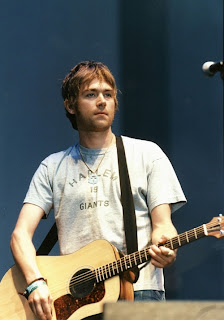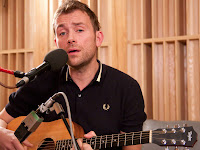England, Damon Albarn and
the Art of Melancholy is a new Blur book which explores
Damon Albarn’s musical career by detailing his various bands, projects, rivals,
inspirations and influences, paralleling Albarn’s music with English
sub-culture and current affairs.
This interesting book also traces Britain across time- Britpop nineties,
English binge-drinking, the shrinking village green, fall of English seaside
towns, explores London’s musical halls and all the aspects of the 'lost England' that seems to be
at the heart of so many Albarn compositions.
The book is available on Amazon (US) (UK) for the Kindle Store, Kindle Fire, Kindle Paperwhite, Kindle, iPad, iPhone and Android ($6.99 / £3.96).
We
recently interviewed author Dylan Moore, who told us all about his writing
process, how Britain influenced Blur’s music, travelling to Essex and faraway
places to research, his excitement for a new record and devotion to all-things
Albarn.
1) Why did you write the book ?
Primarily because I am a huge fan of Damon Albarn's
music, whether that's Blur, Gorillaz, The Good, The Bad and The Queen or any of
his other projects. But also because I cannot believe that nobody else has
written seriously about him! There are a few books about Blur, including the
excellent one by Stuart Maconie, and one devoted to Damon, but mostly these are
round-up type books that are more like extended articles in the music press.
There's nothing wrong with these types of books of
course, but if you look at figures like Bob Dylan and David Bowie, or a band
like The Beatles - and I rate Damon, and Blur at that stratospheric level -
there are whole libraries of devoted scholarship, books that contextualise the
music and treat the musicians in the same way that you might write about a poet
or a novelist.
I think Damon Albarn's body of work not only stands up
to that of any musician, but also documents certain aspects of Britain as well
as any novel or artwork in the last quarter of a century. So naturally I wanted
to be the first to get some real 'Albarn scholarship' out there; in ten years
time, I think there'll be whole shelves of books about Damon.
2) What the book is about?
 The
book explores Damon's life and work, with a particular focus on his
relationship with England. I travelled to many of the places that have been
important to him over the years: the village of Aldham, in Essex, where he grew
up, which is much more rural than you might think, and Walton-on-the-Naze, and
Colchester of course.
The
book explores Damon's life and work, with a particular focus on his
relationship with England. I travelled to many of the places that have been
important to him over the years: the village of Aldham, in Essex, where he grew
up, which is much more rural than you might think, and Walton-on-the-Naze, and
Colchester of course. Also Hallsands in Devon, which is really important: that's where the book starts. There he had the idea for the lyrics to 'This is a Low' and also for Gorillaz' 'Plastic Beach'. And there's a TGTB&TQ B-side called 'Hallsands Waltz', because that band started up at Damon's Devon retreat as well. So basically I use places to get under the skin of the songs.
I'm writing about Damon, but also about England. Of course, there are chapters about Africa and America and China too, but what I argue is that everything comes back to Damon's love for England, which he himself has called 'irrational'.
3) What is your favourite Blur song and why?
Go
for the jugular, why don't you! You know that's nigh on impossible! There are
so many of course, but ultimately I don't think you can look past 'This is a
Low', especially in the context of my book. It's got everything
in terms of English melancholy… it's so emotional and the best bit is Graham's solo towards the end.
4) Who's your top Blur member?
Damon,
obviously. Although Coxon is a genius too.
5) Tell us your favourite part of the book ?
I'm
not sure I have a favourite bit, although I found some bits harder to write
than others. I would've loved to travel to Hong Kong and Mali, particularly, to
take notes in the same way I did for the chapters closer to home.
I
suppose the prologue and epilogue are both quite unique, as what I decided in
the end was to structure the book as though it had all been written last
summer, between July 7th when I went to see 'Dr Dee' at the ENO and the Hyde
Park concert to close the Olympics. It allows the book to finish with Damon
leaving the stage, a union flag under his arm, which is quite poetic.
6) Have you ever seen Blur live ?
Only
about eight or nine times, including quite a lot of festival headline
appearances. My biggest regret is not seeing them earlier. A few of my friends
saw them at Mile End in 1995. I was only fifteen at the time and living in Mid
Wales I wasn't allowed to go, so I had to listen to it on Radio 1. The first
time I saw them was at V97 in Leeds, not long after 'Song 2' came out; I
remember the front of the NME had the headline 'We're the Woo-Hoo Band Now'.
The saddest show was at Benicassim 2003, without Graham; they were brilliant, but it just wasn't right. The best shows were the last night at Hyde Park 2009 and at Reading, which I can't believe was ten years earlier, where I clasped hands with Damon during 'To the End'; I sent my friend a postcard just to tell her - ah, the days before mobiles!
7) What do you think of Damon's new album plans ?
Well,
apart from the fact he's said it's 'folk-soul', for which I read 'Dr Dee meets
Bobby Womack', I don't know too much about it. I'm glad he's finally putting a
'proper' solo record out, and hopefully it will be good for the book, with
people finally recognising his individual genius. Having said that, I'm far
more excited about the prospect of a new Blur album, which has kind of built
into something like a mythical creature over the years.
8) Tell us- what makes your book special ?
It's
serious. In the best sense of the word. It treats Albarn as a true artist and gives him
the respect he deserves, without fawning. And it's not just about Damon; it's about all sorts of things… seaside towns, music halls,
village greens; all the aspects of the 'lost England' that seems to be at the
heart of so many Albarn compositions.
9) Tell us about a special Blur memory
When
'Fool's Day' came out in April 2010 for Record Store Day, it coincided with my
best friend's 30th birthday. We’re both massive Blur fans and kind of became
friends through swapping taped Britpop albums. There were only a thousand
copies made, and I decided it was the perfect present. I queued up outside
Spillers Records, 'the oldest record shop in the world', which has now moved
from its old location on a street called The Hayes in Cardiff, from 5 o'clock in the morning.
I
was the first in the queue and there were two girls just behind me who both
wanted the Blur single. We talked Blur for four hours waiting for the shop to
open while the queue got longer and longer. About twenty minutes before nine,
we were interviewed for local radio about what we were doing.
When
the doors opened, it was all over in a flash. I got the first Blur single and
the girl behind me got the second; when the other girl asked she was told
they'd sold out! I felt so sorry for her (she had to settle for The Beatles
instead - ha!) but so happy I'd managed to get 'Fool's Day' for my friend. When
I gave it to him and told him the story, he said there was no way he'd have
done the same for me!
A
funny little addition to the story was about a year later when I was out in a
bar and a girl recognised me as the man who had beaten her to a Blur single!
10) Did you face any difficulties writing the book ?
Well,
there were a few obstacles, but I won't go into all of them! The main problem
was the practicality of attempting to keep up with someone as busy as Damon!
Just when I thought I'd managed to think about all his projects as a whole, he
announced 'Rocketjuice and the Moon' and the Africa Express train, amongst
others. But that was all part of the enjoyment.
And
I was lucky enough to see the Africa Express gig in Cardiff with my
now-girlfriend, so Damon Albarn continues to soundtrack my life in all kinds of
ways! He played 'Apple Carts', 'On Melancholy Hill' and 'Tender', which is just
a taste of the immense back catalogue he'll have at his disposal for these solo
gigs he's promised.
I live in Valencia now, so if he doesn't come to Spain, I'll have to sell enough books to fly back for that tour!
I live in Valencia now, so if he doesn't come to Spain, I'll have to sell enough books to fly back for that tour!
Read an extract:
This is something that concerns Albarn
in all of his work. On ‘Blue Jeans’, he sings plaintively of his vague but
general satisfaction with life as we are given an insight into his early days
in London, buying
the Dr Martens that were to become his trademark during that early Britpop
period at the Saturday flea market on the Portobello Road.
This song captures not only the acoustic
guitar and cracked-vocal melancholy that was to become an Albarn trademark, but
a time in the singer’s life before the pressures of fame and its trappings and
the speed of his own life began to take their toll on his own mental health.
Author Bio: Dylan Moore is a teacher, broadcaster, writer and editor for the Wales Arts Review. He also contributes to theartsdesk.com and had been featured on BBC Radio 4 and BBC Wales television. His work had appeared on The Daily Telegraph and New Welsh Review.
Got a question? You can get in touch with Dylan on twitter (@_DylanMoore)
Got a question? You can get in touch with Dylan on twitter (@_DylanMoore)
Liked
this BlurBalls feature ? Please comment (no fancy sign ups required) below,
share it within your friends, tweet it, link it up!




No comments:
Post a Comment